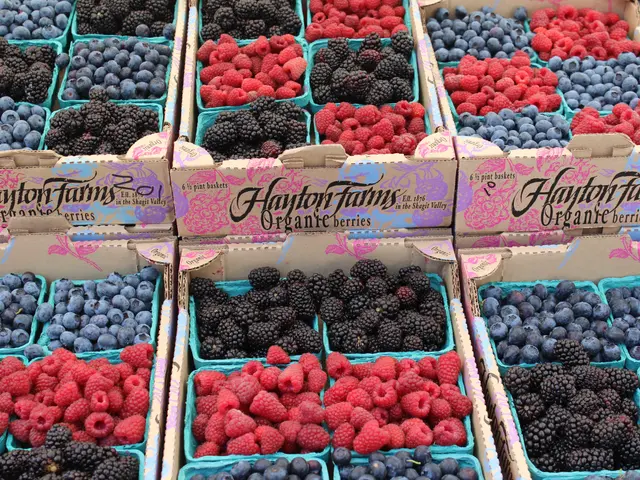Diet for Gastritis: Consuming Suitable Foods and Avoiding Unfavorable Ones, Meal Ideas, and Additional Tips
Chronic gastritis, an inflammation of the stomach lining, can be managed effectively with dietary modifications. Here's a guide to the recommended and avoidable foods for individuals dealing with this condition.
Recommended Foods for Chronic Gastritis
A diet for chronic gastritis emphasizes high-fiber, probiotic, and non-acidic foods to reduce stomach inflammation and promote healing. High-fiber foods such as fruits (apples, avocados), vegetables (carrots, broccoli, pumpkins, beets), whole grains (brown bread, oats, quinoa), and legumes (kidney beans, lentils) are beneficial. Probiotic-rich foods like kimchi, kombucha, kefir, miso, sauerkraut, sourdough bread, and tempeh can also improve gut health [1][3]. Non-citrus fruits such as bananas and melons are less likely to irritate the stomach lining [5]. Lean proteins, like lean meats and seafood, egg whites, and healthy fats, are generally well tolerated [5].
Foods to Avoid or Limit
To alleviate gastritis symptoms, it's essential to avoid or limit certain foods. Acidic, spicy, and highly seasoned foods, such as chili, hot peppers, black/red pepper, curry powder, mustard seed, garlic, onion, tomato products, vinegar, and citrus fruits like oranges and grapefruits, can irritate the stomach lining [2][3]. Fried, fatty, and oily foods slow gastric emptying and can increase acid reflux [2][3]. Caffeinated and fizzy drinks, like coffee (regular and decaf), tea (green, black, peppermint, spearmint), cola, and energy drinks, stimulate stomach acid production [2][3][4]. Alcohol and chocolate may relax the lower esophageal sphincter and increase acid exposure to the stomach and esophagus [2][3]. Highly processed or fast foods containing preservatives, stabilizers, and excessive salt or sugar should be avoided [2][3].
Home Remedies and Other Considerations
In addition to dietary changes, home remedies for gastritis include quitting smoking, limiting or avoiding alcohol consumption, managing stress, and stopping the use of NSAIDs. Certain foods such as berries, fermentable fibers, and whole grains may benefit gastritis. Probiotic foods that may benefit people with gastritis include natural yogurt, sauerkraut, miso, kefir, tempeh, kimchi, and sourdough bread [1].
Chronic gastritis may lead to complications such as peptic ulcers, bleeding, nutritional deficiencies, and an increased risk of cancer. It's crucial to seek medical help if you believe you may have gastritis, as it may indicate an underlying condition that needs medical attention. A doctor may carry out tests to identify the underlying cause of gastritis and recommend appropriate treatments [2].
References:
[1] Mayo Clinic. (2021). Gastritis - Symptoms and causes. https://www.mayoclinic.org/diseases-conditions/gastritis/symptoms-causes/syc-20352989
[2] Cleveland Clinic. (2021). Gastritis - Diagnosis and treatment. https://my.clevelandclinic.org/health/diseases/17241-gastritis/diagnosis-and-treatment
[3] National Institute of Diabetes and Digestive and Kidney Diseases. (2021). Gastritis. https://www.niddk.nih.gov/health-information/digestive-diseases/gastritis
[4] American College of Gastroenterology. (2021). Gastritis. https://www.acg.org/patients/disease-information/gastritis
[5] Healthline. (2021). 12 foods to eat when you have gastritis. https://www.healthline.com/nutrition/foods-to-eat-when-you-have-gastritis
- Individuals with chronic gastritis should consider a diet rich in high-fiber foods like apples, avocados, carrots, broccoli, pumpkins, beets, brown bread, oats, quinoa, and kidney beans to reduce inflammation and promote healing.
- Probiotic-rich foods such as kimchi, kombucha, kefir, miso, sauerkraut, sourdough bread, and tempeh can help improve gut health for those with chronic gastritis.
- Non-citrus fruits like bananas and melons are less likely to irritate the stomach lining for individuals dealing with chronic gastritis.
- Lean proteins, such as lean meats, seafood, egg whites, and healthy fats, are generally well tolerated for individuals managing chronic gastritis.
- To alleviate gastritis symptoms, it's essential to avoid or limit spicy, acidic foods such as chili, hot peppers, mustard seed, curry powder, garlic, onions, tomato products, vinegar, citrus fruits, fried, fatty, and oily foods, caffeinated and fizzy drinks, alcohol, chocolate, and highly processed or fast foods.
- Home remedies for gastritis include quitting smoking, managing stress, and stopping the use of NSAIDs.
- Certain foods, such as berries, fermentable fibers, and whole grains, may benefit people with gastritis.
- Chronic gastritis may lead to complications such as peptic ulcers, bleeding, nutritional deficiencies, and an increased risk of cancer.
- It's crucial to seek medical help if you suspect you may have gastritis, as it may indicate an underlying condition that needs medical attention.
- A doctor may conduct tests to identify the underlying cause of gastritis and recommend appropriate treatments.
- Adhering to a healthy lifestyle, including fitness-and-exercise, nutrition, and healthy-cooking, is essential for managing chronic gastritis.
- The science of health-and-wellness, food-and-drink, and multiple aspects of lifestyle further research on how to effectively manage and prevent chronic gastritis and other health conditions.






